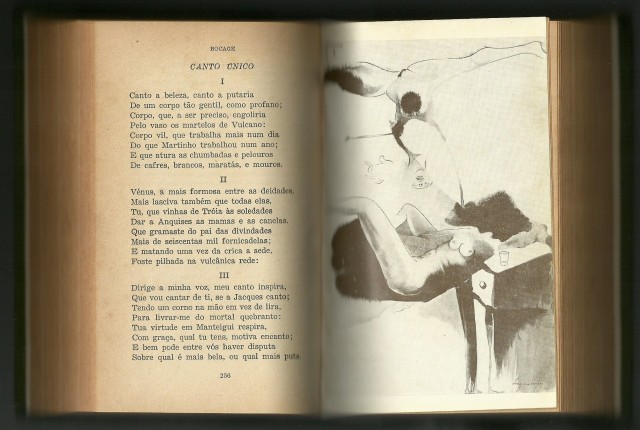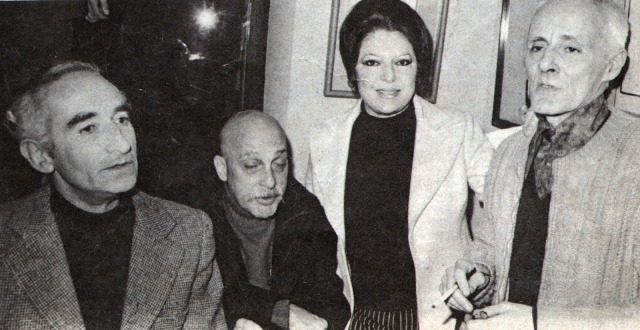
The UL recently acquired a new edition of the Antologia de poesia portuguesa erótica e satírica, a book that represents an important part of Portuguese literary and political history. First published in December 1965, the book’s release earned its editor, the poet and writer Natália Correia, a 3-year suspended prison sentence.
To 21st century eyes, this is a scholarly and comprehensive work of anthology. It compiles works by most of the major figures in Portuguese poetry dating back to the medieval troubadours, including Camões, Bocage, Almeida Garrett, Fernando Pessoa and António Botto. Also included are those then-contemporary poets – such as Maria Teresa Horta, Mário Cesariny, Herberto Helder, Luiz Pacheco, Jorge de Sena and Natália Correia herself – who have since come to be considered equally canonical. Therefore, it is interesting to reflect on the “seismic shock” (as Correia described it) that the book caused on its initial publication.

The Antología was published 9 years before the Carnation Revolution that finally ended Portugal’s Estado Novo regime. At the time of its publication the Azorean-born Natália Correia was already well established as a prominent political activist and opponent of the government and its ultra-conservative form of nationalism. Her compiling of the book, focussing as it did on erotic and satirical material, was clearly an intentionally political act. The book’s publisher Edições Afrodite, started by the flamboyant 23-year old Fernando Ribeiro de Mello in 1965, had already come to the attention of the authorities due to its publication of a swiftly banned edition of the Kama Sutra.
Before 1965 was over, the Antologia de poesia portuguesa erótica e satírica was seized and withdrawn by the PIDE (the state police of the Estado Novo), due to what the censor’s report described as the book’s “pornographic character” and “lack of scruples”. Perhaps more than the content of the actual poems anthologised in the collection, the report took particular issue with Correia herself and her editorial role. This is probably unsurprising, given that she was already seen by the regime as a problematic figure, having participated in opposition movements since the 1940s. Indeed, the very act of a woman compiling such a definitive work of Portuguese literature (not to mention one so controversial) represented an affront to the extremely patriarchal government and culture of the time.
-
-
-
-
-
- The 1965 censor’s report
-
-
-
-
We can see how the report targeted Correia in its description of the “Sartrean tendencies” of her introduction to the Antologia – Sartre was another author hated by the Estado Novo regime, with many of his works on the banned list. It also tried to undermine her scholarship, accusing her of misattributing several of the collection’s poems to Bocage and Botto – accusations which have since been shown to be incorrect. It even tried to link her to communist causes, which the regime opposed vehemently but to which Correia had no connection whatsoever. As Luiz Pacheco, also persecuted for his involvement in the book wrote to Correia, “we are facing a political process camouflaged as a literary one”.

Natália Correia was eventually tried in the early 1970s and sentenced – along with some of the other contemporary writers featured in the Antologia, Cesariny, Pacheco, Ary dos Santos and Ernesto Melo e Castro – to three years (suspended) for “abuse of freedom of the press”. However, Fernando Ribeiro de Mello and the bookseller Luis Alves Dias had already published a pirate edition of the Antologia (presented as a Brazilian import and therefore exempt from censorship) long before the trial, selling 3000 copies, which effectively foiled the PIDE’s plan to suppress the work.
Correia’s experiences only increased her commitment to the pro-democracy and feminist movements in Portugal. In 1972, she was involved in an even more momentous case when she was prosecuted for editing Novas cartas portuguesas, along with its authors, Maria Velho da Costa, Maria Isabel Barreno and Maria Teresa Horta. These three came to be known internationally as “The Three Marias”, and their writing and consequent persecution announced to the wider world the extent of dictatorial and Catholic patriarchal repression in Estado Novo Portugal.

Although the regime fell in 1974 and Portugal transitioned to democracy and greater freedom, the Antologia de poesia portuguesa erótica e satírica was not officially republished until 1999, six years after Natália Correia’s death. This new edition (the fourth, including the pirated second edition) is the first since 1965 to include the original illustrations by Cruzeiro Seixas, as well as material dealing with the book’s banning and the subsequent trial. It is a fitting tribute to a generation of revolutionary artists, of whom Natália Correia was a leading figure.

Christopher Greenberg



